
Recently on Cyclingnews.com |
An interview with Lance Armstrong, March 23, 2009
Armstrong talks Giro, Twitter and Tour
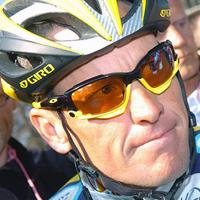
|
Cycling has changed since Lance Armstrong's retirement in 2005. Having returned to the sport late last year, the American admits that he's finding the pace tough, but there's a feeling he's enjoying the challenge. As he makes the first European racing appearances of his comeback, Armstrong tells Cyclingnews' Gregor Brown about life in the faster lane, Twitter, testing, this year's Giro and the prospect of an eighth Tour de France crown.
The return
Cyclingnews: What are the big differences in the peloton since
you retired in 2005?
Lance Armstrong: I am honestly still trying to figure that out. It is
tricky for me to figure out so far because Australia has been an anomaly and
California is kind of an anomaly.
I can tell you that from Australia and
the Tour of California
the racing has been fast. I think that's good for racing, good for the
sport... You roll around in Australia and all of a sudden you are on the limit,
and you say to some guy, 'I thought this was a fun race.' I thought it was one
of these races where guys have a beer the night before and then show up and
race the next day. The next thing you know, this year we are all in the gutter
and suffering on the limit.
I think those guys realise that the races are televised around the world.
Every media outlet from the neighbourhood paper all the way up to the international
papers were there. There is a lot of added attention and pressure from their
sponsors and teams. So the guys came fit and ready to race. That happens, and
shit, the thing rolls down the road a lot quicker.
CN: Can you put a figure on how much your comeback has generated
to date for the Livestrong foundation?
LA: It's an interesting time for all of us. Most non-profits are working
on a 40 to 50 percent reduction in funds raised for this year based on the economy
in the United States and around the world. We are flat to slightly up; I suspect
that has to do with the comeback and the added attention around that.
"If you laid out all the sports next to cycling... and asked who has been as aggressive and progressive as cycling... The answer is, nobody comes even close."- Armstrong compares the efforts cycling has made to eradicate doping and those of other sports. |
CN: When you are racing you receive appearance fees and maybe
bonuses. Since your comeback, do you give any of that money to the foundation?
LA: I would like to point out that is the way I have made my living for
the last three or four years; doing speeches or making appearances around the
world. Quite a few in the United States and in countries like South Korea, Denmark...
that is income for me. Having said that, I am the largest single donor to my
foundation.
Obviously, a company like Nike, which contributes 100 percent of the profits from the Livestrong line to the Armstrong Foundation, easily eclipses my personal donations. The answer is a tricky answer, I could say yes and I can say no.
CN: Since 2005, more riders are speaking out against doping.
Why do you think that's the case?
LA: I think we had that back before 2005. Our sport has been troubled
by these issues, so it is normal and natural. It is not just riders, but the
organisers, press, sponsors and fans who are also speaking out.
CN: What allows this 'new' openness to speak about doping?
LA: I didn't know it wasn't allowed. [Laughs] You have high profile cases
that cause people to step back and say 'Whow, what is going on here in cycling?'
It is just like any family or any corporation that might have an issue – like
a lot of the economic stuff in the United States – to step back and say, 'We
are going to have to address this. How do we, A) Talk about it with transparency,
B) Move forward, C) Try to rebuild things?'
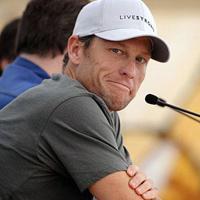
|
Cycling is clearly in the middle of that. I think some of it is a good thing to discuss. I think in the middle of all of this cycling is trying very, very hard, and has received very little credit for it.
If you laid out all the sports next to cycling – put us in the same basket as tennis, track and field, soccer... all those other major European sports (if you want to use American sports, then we can really have a discussion) – and asked who has been as aggressive and progressive as cycling... The answer is, nobody comes even close.
We have tried really hard, along the way we have not received any credit and continued to catch more people. In a sense, it is a little bit like a dog chasing its tail. When anyone sees a dog chasing its tail it doesn't look good. You can say 'keep it up, you might catch it' and one day he might catch it and it's going to hurt.
I have never been a fan of constantly yelling, kicking and screaming about doping. I am fan of acknowledging it, fixing it and then moving on. I think if you race everyday and preach how clean you are, and someone else works hard every day and talks about how mach they want to win, it almost soils their efforts. That is not to say they are cheating or cutting corners, that is just to say that they want to focus on the sport.
Most other sports don't approach it that way, Most other sports have a strong athletes' union. I think if cycling was a little stronger on the riders' front you would see a completely different scenario.
Perhaps we are moving out of it, but I think cycling has been in the middle of a civil war. I think everyone has been at war: from the riders to the teams to the organisers to the press to the fans to the industry. At some point there has to be this balance, a set of rules. If you break the rules you get the hell out and we are moving on – the quicker we can get to that point the better.
Debuting at the Giro
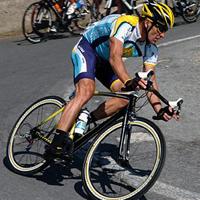
|
CN: We have heard that you
previewed the Ligurian time trial. What did you think of it, and will you
use a normal road bike like
Damiano Cunego?
LA: It is very hard; I think that anyone who has gone and seen it is
surprised by its difficulty. I don't think that is a bad thing – it's exciting.
I do think it's suited to a traditional road bike with some sort of aero setup. That is based primarily on the number of climbs, which are long, sustained and not easy. Over the course of 62km there is approximately 1500 metres of climbing, which means it is a real day's work in terms of climbing.
CN: What effect could that TT have on the race? On paper it will
rule out quite a few possible contenders.
LA: No doubt, there will be significant time gaps. Those who typically
take it easy in a time trial will not be able to do so if they [the race jury]
enforce the time cuts.
CN: What are going to be the other decisive stages?
LA: I have not seen anything else, other than the time trial. People
point to the mountain stages, which are always critical. I won't spend the time
previewing them like the other guys, unless Google maps counts. [laughs]
I just don't have the time; I have to go back and be with my kids for a few weeks. Some of them [stages] aren't even possible to view and may not be even possible to race in May based on the amount of snow that Europe has had this winter and spring.
CN: Which teammates will you bring along for the Giro d'Italia?
LA: I know that Levi [Leipheimer] is coming, Jani [Brajkovic] is coming,
[Chris] Horner... I don't know, I haven't requested anybody. Johan [Bruyneel]
has a plan; the team has to do all three big tours and he has to be conservative.
Our team will be strong, just with those guys I named and riders like [Steve]
Morabito, [Tomas] Vaitkus, [Grégory] Rast or Chechu [José Luis
Rubiera]... the team will be complete.
CN: You never have ridden a Giro d'Italia, let alone won an
edition. Would a Giro win complete what has already been a great career?
LA: It would be cool, no doubt. I am not sure, based on where I am today
and how good I think the other guys will feel, the Italians especially, that
I will be in contention to win. But, I will be close. Quite honestly, as I said
many times, it was a regret I had and one that fortunately I can reconcile –
go experience and ride around a great country for three weeks.
Do you Twitter, sir?
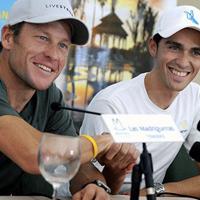
|
CN: You encouraged Alberto Contador via Twitter during Paris-Nice,
but you seemed to criticise him in L'Equipe after the race. Can you describe
the relationship between the two of you?
LA: In the beginning you work off the assumption that nobody is going
to read it [Twitter posts]. If I look at the page and see that 340,000 people
are reading it, you've got to figure a few journalists are following it as well.
My comments on Alberto were not a criticism. If you read all the postings, I said, 'An amazing talent, but has a lot to learn.' That is not a negative comment. You have to admit there were some tactical errors made. If you read the follow up Twitter I said, 'Tough and unfortunate day; he will be back fighting tomorrow'.
CN: You mentioned in L'Equipe that he
could use the team more...
LA: I think some of this is a discussion he and I need to have. I will
see him in Spain, and I certainly am not going to talk about the tapas;
we need to talk about bike racing, too. There is a way to conserve a team, there
is a way to lead a team, there is a way to use them in critical and strategic
times and then there is a time to let the race go. That is cycling and
that is what I learnt over 20 years of doing it.
The fans, and more so the media, are trying to build up this internal battle for the Tour. It's good for you guys, good for the sport... I get it. It will lead us to be completely silent and not play that game because it is not worth the drama in our lives.
Plenty of times in my career Eddy Merckx spoke out and said this or that, but I still like him like a father today. He was right. If he said 'you f***ed this up and and you should have learnt,' I got it. I am a sponge and I can listen to people; that is not a bad thing.
"The fans, and more so the media, are trying to build up this internal battle for the Tour. It's good for you guys, good for the sport... I get it."- Armstrong discusses the Astana team dynamic in 2009.. |
CN: Do you believe you are targeted by the testing agencies more
than other riders are?
LA: I don't know. I don't think people are sitting in an office and saying
'let's get him.' When you been out of the sport for so long and you have the
biological passport that has evolved, which is essentially a collection of data.
They have to establish data and these collections so they can create a curve
for you and would know if there is any sort of abnormalities.
I think it is normal – they say, 'We haven't seen this guy in three years; we need to get some data.' I can understand that. There are 24 out-of-competition tests (one was in competition, a random test after the Tour of California prologue). Is that abnormal? I talk to a lot of other cyclists and when they are less than five I think that answers the question.
CN: How many of the tests are carried out by Astana's internal
doping programme since you've been back?
LA: There is a company called PWC that comes. They run all the collections
programmes for others, the UCI and [Rasmus] Damsgaard, so it hard to know. Damsgaard
works with Anne Gripper and the UCI in terms of creating this biological passport
and profiles, so you don't have constant testing of guys when quite frankly
you don't need it.
When PWC comes and says, 'this test is being carried out on the behalf of the UCI,' Damsgaard is also getting those results. Damsgaard does not show up to my house and say 'Hey Lance, come over here and pee in a bottle.' That's not the way it works.
CN: Team Saxo Bank decided to terminate his services. What effect
does that have on his legitimacy?
LA: None. I don't think they totally eliminated using his services. I
don't think it has any affect. I think he has one of the most stellar reputations,
certainly in Europe, if not around the world.
At some point you would hope that the independent programmes are not necessary. At the end of the day, the governing bodies and anti-doping agencies are not fans and supporters of independent programmes. The need for the independent programme says the others are not doing their jobs.
An eighth Tour win...
"I love the event and everything it stands for. I love its difficulty, its history... You've got to go there."- Armstrong's love affair with the Tour de France will begin another chapter in 2009. |
CN: The other day you
rode this year's 15km opening time trial. What can you tell us about it?
LA: It is extremely challenging. Back in the day I would have won it,
but that was when I was in my early 30s, not in my late 30s. It will be challenging.
Quite honestly it will be perfect for Alberto. It is eight kilometres up and
eight kilometres down; it is very technical, real snappy and really twisty.
CN: If Contador wins the time trial would that establish who
is captain within Astana?
LA: That time trial is going to establish a lot for the race. It will
start to establish a lot of the pecking order within all teams and favourites
for the race.
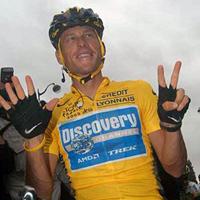
|
CN: We've seen big squads with too many leaders at the Tour in
the past – T-Mobile in 2005 springs to mind. Could Astana have a similar situation
on its hands?
LA: Probably not, but I would default to Johan on that. I don't think
that is his style. We saw how that worked and we used it a lot of times to our
benefit. I don't think he would take that approach, although the team is interesting
because there a lot made about Alberto and me. However, if you look at the nine
guys who could potentially line up you have five guys who have finished in the
top five of the Tour, so it goes deeper than just Alberto and me.
CN: Is the Tour de France your number one goal for 2009?
LA: I think that is fair to say. The Giro is a close second. There is
not doubt that it [the Tour] is the biggest bike race in the world. It is the
one people know in Italy, India and Indiana.
Of course I have a bit of history there and it is nice to be back. I love the event and everything it stands for. I love its difficulty, its history... You've got to go there. It would be a dishonour to go there and not be at the peak of my fitness.
CN: It's just for pride and the cancer foundation then...
LA: Yes. It's hard not to do it. It's the Super Bowl, you want to be there.
I want to be there, I'm having a heck of a good time; I want to go on long hard
training rides. I went down and rode the Tour time trial, not just once, but
about ten times now. I do that stuff became I want to and I'm having fun. The
same goes for the month of July. I may not be popular with everybody in this
country [France], but it's a reality.
Related articles:
Cyclingnews' complete coverage of Lance
Armstrong's comeback
An interview with Lance Armstrong - July 23, 2005: No
regrets
Cyclingnews' preview of the 2009 Giro d'Italia
